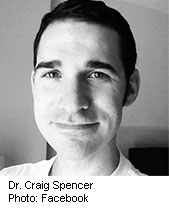Says society needs to have faith in the science-based infection-control protocols developed
FRIDAY, Feb. 27, 2015 (HealthDay News) — Many U.S. politicians and media outlets hyped the threat of U.S. cases of Ebola last year, according to a newly written personal account by Craig Spencer, M.D., M.P.H., the last American Ebola patient treated in the United States. He also believes that officials and the media unnecessarily maligned those who were risking their lives to combat the West African epidemic.
Spencer contracted the virus while performing aid work at an Ebola treatment center in Guinea, and became ill days after his return to New York City. He entered Bellevue Hospital on Oct. 23 as New York’s first Ebola patient, and spent 19 days there recovering from his infection. “Though I didn’t know it then — I had no television and was too weak to read the news — during the first few days of my hospitalization, I was being vilified in the media even as my liver was failing and my fiancée was quarantined in our apartment,” Spencer writes in a letter published online Feb. 26 in the New England Journal of Medicine.
While he was in the hospital, media outlets hyped the potential threat of Ebola and criticized Spencer for going out into the city after his return, he writes. At the same time, politicians used the virus seemingly to score election-season points with voters by enacting poorly considered quarantines. Fear motivated these decisions, and Spencer says that as an American aid worker he well understands that fear, “because I felt it on a personal level.”
“Ebola is frightening not just because of its high fatality rate, but also because of how little we know about it,” he writes. “We cannot explain exactly what it does to our bodies, nor tell patients who survive it how it may affect them in the future.” Spencer pointed out that society needs to have faith in the science-based infection-control protocols developed by public health professionals because those protocols have worked. He noted that the protocols worked for him because he didn’t infect anyone. And, those protocols have “worked for hundreds of my colleagues who have returned from this and past Ebola outbreaks without infecting anyone.”
Full Text
Copyright © 2015 HealthDay. All rights reserved.








